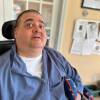Samantha Webster wears a mask in indoor spaces, even when she's the only one.
The 29-year-old graduate student with rheumatoid arthritis says she felt safe from COVID-19 when she went to the hospital for care, knowing she could count on medical personnel to take the same precautions. But last week, the federal government ended the public health emergency — and with it the requirement for hospital personnel and other patients to wear masks. Now Webster is scared of getting sick from a place meant to care for her.
“I just think a lot of people don’t really know the challenges that immunocompromised people are facing,” Webster recently told GBH News. “They don’t truly know the danger that this poses.”
Webster is among a number of people in Massachusetts concerned about how the ending of the federal and state emergency will affect them.
In a series of interviews with GBH News, people said they are worried about going to appointments in hospitals no longer tracking hospital-acquired infections, because they can't assess the risk of catching coronavirus from going to a medical appointment. They’re also troubled about not being able to access some of the silver linings of the public health emergencies, like insurance-covered telehealth appointments, free vaccinations and free COVID-19 tests.
Across the state, most hospitals are changing their masking policies, or dropping universal masking entirely. Among the major hospitals and health networks doing away with universal masking are Boston Medical Center, Mass General Brigham, Tufts Medicine, Children’s Hospital of Boston, Beth Israel Lahey, Cambridge Health Alliance and UMass Memorial Health.
Ronny Bachrach, a Newton resident whose 4-year-old daughter is treated at Boston Children’s Hospital for systemic arthritis, said she's worried about heading back to six-hour infusions she attends with her daughter every few weeks.
Her daughter’s providers are “receptive” to masking, she said, and she’s told that patients can ask providers to mask, but she is still nervous.
“We spent this entire pandemic masked with other providers in the room,” said Bachrach. “I just couldn't imagine all of a sudden right now thinking it's OK to stop.”
Mass General Brigham created a stir last week when it posted on its website, and sent to patients in its portal, a question-and-answer section including this:
"Q: I'd be more comfortable if my doctor, nurse or another care provider wear a mask. Can I ask them to?A: No. You cannot ask staff members to wear a mask because our policies no longer require it. Our system is adhering to current public health recommendations."
The wording enraged lawyer and disability activist Matthew Cortland, who filed a complaint with the civil rights divisions of the U.S. Departments of Justice and Health and Human Services.
“It's a blatant violation of federal disability, civil rights laws, and also the laws of the commonwealth of Massachusetts,” Cortland told GBH News.
The hospital eventually took the language down from its site. Hospital officials released a statement, saying they “are committed to ensuring that patients can access medical care in a safe and appropriate manner,” and “patients can ask, but providers determine when and if masking in a particular situation is clinically necessary.”
Cortland doesn’t feel this is enough.
“I want them to post an affirmative explanation of how disabled patients can ask staff to mask,” Cortland said. “MGB must mitigate the harm their bad info caused and demonstrate a commitment to complying with civil rights law.”
Webster said when she heard of Mass General Brigham's original language online, she called the hospital for clarification about what would happen if she chooses to ask staff to mask.
“They said it could result in the security being called, which seems like a little bit of an overreaction,” she said. “I didn't mean to be hostile in any way. I just want to know how best to protect myself when I do go to the hospital.”
Mark Murphy, senior director of external communication at the hospital system, told GBH News that Webster was misinformed. “To clarify, patients would not be escorted out by security if they were to simply ask staff to mask,” he said in an emailed message.
"MGB must mitigate the harm their bad info caused and demonstrate a commitment to complying with civil rights law."Matthew Cortland, lawyer and disability activist
Massachusetts Coalition for Health Equity is raising awareness about patients and providers’ concerns about COVID exposure and how the end of the public health emergencies impact that, as part of a national campaign this week. They're reaching out to legislators, hospitals and public health agencies. About 6.2% of people age 18 to 64 are immunocompromised in the United States, according to a 2020 report by the Centers for Disease Control and Prevention.
“The MGB policy that is, quote, 'your provider will decide if you need others to mask in your presence' is problematic and discriminatory and racist given the history of what we have seen in the medical system,” said Dr. Lara Jirmanus, co-founder of the organization.
Jirmanus said many patients are trying to get accommodations to require providers to wear masks around them. She’s heard no word of their success.
“I personally have actually done so on the phone and was told by an MGB staff person that I didn't have to worry about COVID anymore because it wasn't a big deal,” she said.
Mass General Brigham confirmed they have received complaints over the new policy and said they are responding to those individuals. The hospital system added that patients can direct concerns about masking to the providers in charge of their care.
Carlene Pavlos, executive director of the Massachusetts Public Health Association, said her organization supports a more nuanced approach to masking. For example, she said UMass Memorial Medical Center in Worcester will keep masks in higher-risk settings like the emergency and oncology departments.
“The end of universal masking policies in health care settings will put those seeking medical care who are already more vulnerable — people with respiratory diseases or cancer, people with disabilities, and older adults — at risk of contracting COVID and other potentially life-threatening illnesses,” she said.
Other medical facilities and local governments around the United States, including Seattle, Los Angeles County and hospitals in New York — will continue to require masking at hospitals. In Boston, Dana-Farber Cancer Institute says is also will still require universal masking.
"We know that many area hospitals are moving away from this requirement, but at Dana-Farber we see many patients who have weakened immune systems due to illness or their treatment," a hospital newsletter said.
COVID-19 has killed nearly 1,500 people in Massachusetts since January, according to state data. It’s still the third leading cause of death in the United States. Just this year, over 4,400 people contracted COVID-19 in a Massachusetts hospital, according to federal data .
And it’s not just the lack of masking that worries people. Artist Mary Jirmanus Saba says she’s worried about losing benefits like telehealth and finding free COVID-19 tests. She’s on MassHealth and lives with an autoimmune condition and prediabetes.
“How am I, a high-risk person, supposed to protect my family if I don't have access to the tools?” the Malden resident said.
She uses telehealth extensively, and even has a physical therapist she can see that way. She tests often to keep herself and the many immunocompromised members of her multigenerational household safe, but she said the high costs of rapid tests and PCR tests make it unaffordable to continue testing at the frequency she had been.
“What we're seeing happening is that disabled people are being shut out of public life,” she said.








